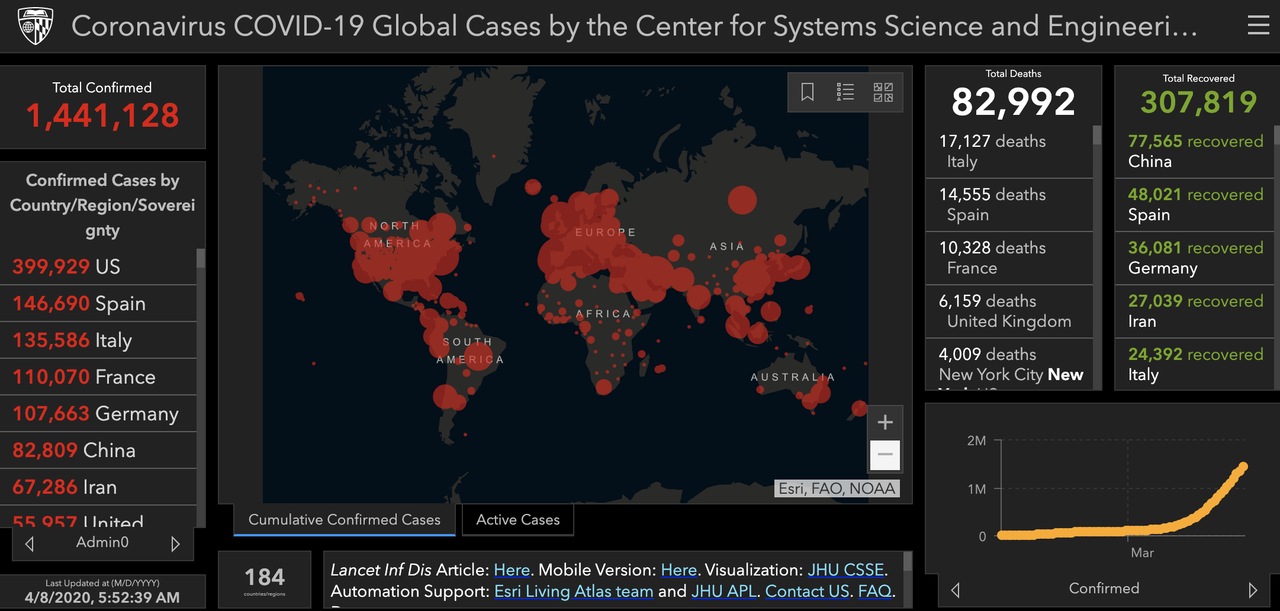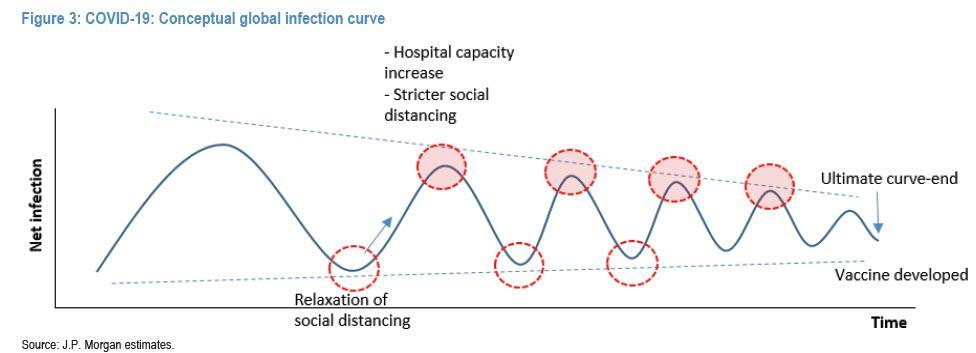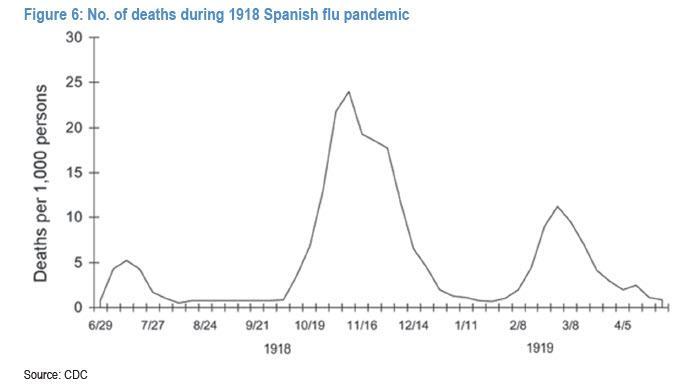Across the US, chatter on social media about the need to get at least some of the shut-down economy back online has intensified in recent days, as political commentary as inspired heated discussions as opponents accuse Republicans and many regular Americans of callously placing the economy and their own self-interest above protecting society's most vulnerable. Meanwhile, the global case total has surpassed 1.4 million, with 83k+ deaths.
But as JPM projected, and as was the case during SARS and other prior pandemics, even if the novel coronavirus does begin to recede heading into the summer, remember: this is only part one.
At this point, it's not like anybody is going to snap their fingers and suddenly turn the clock back to Dec. 31, 2019. Many Americans - especially those at high risk - will likely cut down on leisure air travel, as pundits are already talking about the death of the "one-flight meeting".
But as we begin to weigh the pros and cons, and the Trump Administration reportedly weighs a plan to reactivate parts of the economy and allowing some people to get back to work if they can demonstrate that they're healthy, the SCMP late last night highlighted some new scientific evidence that is extremely disturbing.
As we explained above, by lifting restrictions on Wuhan, China is potentially unleashing hundreds, maybe even thousands, of asymptomatic carriers on the rest of the country. But scientists believe the 'herd immunity' that has supposedly been built up during the first wave should blunt the impact of ensuing waves somewhat. Well, unfortunately, it looks like that thesis needs to be reexamined.
Since the early days of the outbreak, we've seen reports about people being reinfected with the virus (though in some cases there were doubts about whether the virus ever really left). Well, now, a team of researchers at Fudan University in Shanghai has discovered that an alarmingly high number of recovered patients whom they've tested show low, or no, levels of the virus antibodies in their blood. That means a sizable chunk of those who are infected will be vulnerable to reinfection.
In other words, if these findings are confirmed, the hoped-for "herd immunity" that is supposed to help us get things back to normal in the time between now and however long it takes researchers to mass produce a vaccine simply isn't going to materialize: Instead of diluting the density and acting as blockers for spread, many will be reinfected, and go on to spread the virus to others, all over again. It's just the latest reason to worry that the second wave of the virus could be larger than the first.
Some countries are already seeing the first stirrings of a second wave: On Wednesday, Tokyo reported a record 144 new cases on Wednesday as PM Shinzo Abe's lockdown (which is legally toothless but has inspired most businesses to close nonetheless) took effect.
As the virus continues its woefully underreported spread across Africa - or so public health experts fear - Ethiopia announced on Wednesday that it's joining a growing list of African nations - already including Botswana, Congo, Ivory Coast, Senegal, South Africa and others - by declaring a state of emergency over the virus. The country's 110 million people have been relatively unscathed, reporting just 52 cases so far, though some fear that the country's close ties to Beijing and commerce between the two nations means many more cases have gone unreported.
Iraq also extended the closure of its main border crossing with Iran as the 'official' death toll in that country passes 10k. Much to Trump's delight, the decision will put added economic pressure on Tehran, as it will disrupt trade between the two nations, something upon which Iran's sanctions-starved government greatly relies.
Certain progressive media outlets in the US will likely never forget that certain conservative pundits and even - to a much lesser degree - President Trump, Mitch McConnell and other Republican leaders played down the coronavirus as the first cases were confirmed in the US. While President Trump likes to brag about his decision to shut down travel from China, in reality, that was a half-measure (he should have shut down travel from Europe, as certain senior advisors reportedly urged). And while they're not wrong, they're only telling part of the story. A lot of people in positions of power - including, as the Intercept notes, NYC's Democratic mayor - either underestimated the outbreak, or have changed views on subjects like drugs, whether shutting down schools makes sense, whether a partial shutdown that preserves more of the economy might be a more appropriate response - the list goes on and on.
Going through this list, it appears to us that nobody is more guilty than the WHO, which is partly why President Trump is insisting that the US reexamine the WHO's funding, and has mocked the WHO for 'totally blowing it'.
Of course, anybody who has only just started paying attention in the past few weeks (ie most of America) probably doesn't remember the WHO dragging its feet on the global threat and pandemic designations (those were two separate declarations), while also insisting that travel restrictions and border closures weren't appropriate at a time when those decisions could have gone a long way toward suppressing the spread.
Because as the White House reportedly prepares a plan to get some healthy people back to work in the not too distant future, the WHO is now urging that countries considering a lifting of their lockdowns should probably reconsider (even as China prepares to send legions of infected Wuhan residents across its own country, and the world).
The WHO said Wednesday that "we have a long way to go” to defeat the pandemic, said Dr Hans Kluge, the WHO regional director for Europe, adding that now is “not the time to relax [lockdown] measures,” and all countries must “double and triple our collective efforts”. “We still have a long way to go,” he said. “The progress we have made so far in fighting the virus is extremely fragile.” Any relaxation of social distancing measures requires “very careful consideration,” he added. “We need to remain committed.”
His remarks were clearly directed at the West (after all, he was speaking in English), but would the WHO, which has come under fire for refusing to criticize Beijing, say the same about Wuhan?
If you, dear reader, happen to be a billionaire like Microsoft founder Bill Gates, or at least wealthy enough to perhaps be insulated from the vicissitudes of the combined economic and public health crises which have caused the economy to literally grind to a halt, then perhaps you don't understand how bad things really are out there (after all, the stock market has really bounced back over these last few days). For those who still believe most Americans could survive a ten week total economic shutdown, the OECD would just like you to know: Most of the world is already officially in a deep recession. A leading indicator published by the Paris-based NGO showed its biggest drop on record.
Just in case you weren't aware, the global economy is a giant dumpster fire right now. And while people with comfortable white collar jobs are shouting at everybody to "stay indoors!!!!", there are millions of people are this country who are still waking up every day trying to figure out how they're going to eat, or take care of other essential needs, in the middle of a lockdown.
That doesn't mean people should just flout the lockdown when they feel like it, it's just a reminder that everybody deserves the benefit of the doubt.
- Source, Zero Hedge


